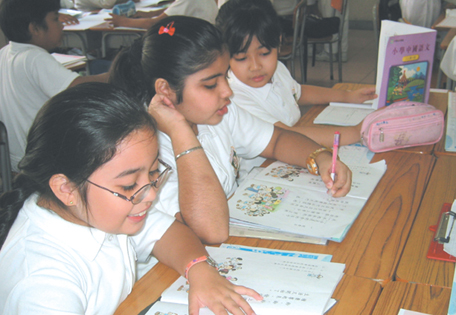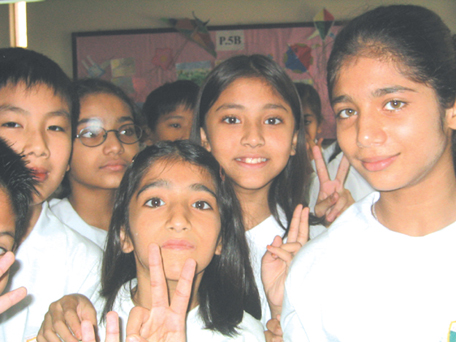South Asian students have difficulties learning Chinese

South Asian students in Hong Kong have limited choices in education. (Winki Kwok)
By Winki Kwok
Tarmang Santosh is a 12-year-old Nepalese living in Hong Kong. Currently enrolled in a local school, the Primary 6 student has studied Chinese for about 3 years.
Now he can speak a little Cantonese. However, he is not good at reading and writing in Chinese.
He said, “The Chinese characters are too complicated.
“I may be able to recognize the words in the textbook. But if the same words appear outside school, I do not know them.
“When I write Chinese characters, I feel like I am drawing pictures.”
According to the 2001 Population Census, about 250,000 South Asians live in Hong Kong. They make up 3.7 percent of the total population in the territory. More than half of them cannot speak Cantonese.
Fermi Wong Wai Fun, director of Unison Hong Kong For Ethnic Equality, said, “Although many South Asians were born and have lived in Hong Kong for many years, most of them are not good in Chinese.
“Some of them can speak Cantonese, but their reading and writing skills are not good.”
According to Ms. Wong, South Asian students in Hong Kong can study Chinese only in primary schools. In secondary schools, they are required to learn another foreign language, such as French, instead of Chinese.
It will be difficult for them to integrate into society and find jobs in future because of this language barrier.
Some South Asian students also face problems in furthering their education in Hong Kong. Currently, they can only choose from a limited number of primary and secondary schools that offer Chinese courses designed specially for foreign students.
They also need to fulfill certain unfavorable university entrance requirements.
For example, The Chinese University of Hong Kong requires applicants to have a certain aptitude in Chinese.
According to Leung Lai Fong, an admissions officer at the Chinese University, candidates applying through the Joint University Pro-gramme Admission System, also known as JUPAS, are required to obtain Grade E or above in Advanced Supplementary Level Chinese Language and Culture.
For students who did not take the Advanced Level Examination or did not apply through JUPAS, the prerequisite of knowing Chinese is still in force.
This poses a problem for South Asian students who have not studied Chinese in their secondary schools.
Realizing this, the Chinese University offers an alternative for them.
Ms. Leung said, “If they have not taken any Chinese examination, but perform very well in other subjects, they can still apply to the university.”
But still, students must obtain a pass in a Chinese language test arranged by the university.
Ms. Leung said that different departments have their own tests, grading systems and required grades for entrance. There is no standard format.
Some schools recognize the importance of the Chinese language and offer Chinese courses for South Asian students.
However, they face difficulties in launching these courses since there is no standardized Chinese curriculum for South Asian students in Hong Kong.
Yaumati Kaifong Association School is a primary school mainly for South Asian children.
Wan Siu Hang, head of the Chinese panel of the school, said, “The school provides Chinese language courses for Primary 1 to 6 students.”
Since there are no standard textbooks for students who learn Chinese as a second language, the school uses books that are written for local students.
“Chinese is not the mother tongue of South Asian students,” Mr. Wan said. “It is difficult for them to follow the local Chinese curriculum.”
To help students cope with the language, teachers modify the curriculum according to the students’ standard.
Said Mr. Wan: “For example, Primary 5 and 6 students have to use the book designed for local Primary 3 students.”
In addition, teachers do not complete all the chapters in the textbooks.
Mr. Wan said, “We teach students some simple, but important Chinese words. We hope that they can recognize and pronounce them. We also design our own worksheets.”
Delia Memorial School (Hip Wo) also recognizes the importance of learning Chinese for South Asian students in Hong Kong.
It is one of four secondary schools that accept a majority of South Asian students.
The schools started offering Chinese language courses 3 years ago.
Tsui Fuk Keung, principal of the school, said, “We used to provide English and French courses only.
“But Chinese has become more important in Hong Kong since 1997, so we have made Chinese a compulsory subject for lower form students in our school.”
The school does not follow the Hong Kong curriculum but the one widely adopted in Singapore.
“It is designed specially for students who learn Chinese as a second language and should be more suitable for them,” said Mr. Tsui.
According to Ms. Wong, director of Unison Hong Kong For Ethnic Equality, the Education and Manpower Bureau will provide support for schools offering the British General Certificate of Secondary Education or Scholastic Assessment Tests II Chinese to ethnic minorities in Hong Kong.
However, it is not compulsory for secondary schools to offer such tests and Ms. Wong is worried that the existing Chinese curriculum will not be able to support these Chinese tests.
Not put off by the difficulties in learning Chinese in Hong Kong, Tarmang said he is still keen to improve his Chinese.
He said, “I can only play with friends of the same race. If I know more Chinese, I can make more friends.”

Many South Asian students find the local Chinese curriculum
too difficult, so teachers modify the syllabus. (Winki Kwok)